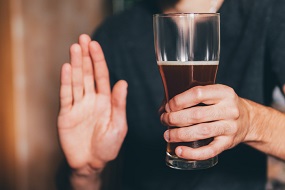Beyond Dry January: The Benefits of Extending the Popular Challenge

DETROIT -- Many who kick off the new year with the month-long sobriety challenge known as Dry January see improvements in their health and decide to continue the break from booze into February.
Henry Ford Health addiction medicine specialist Elizabeth Bulat, MD, says extending the challenge may be a good opportunity to address underlying issues like anxiety or depression that may have been overlooked otherwise.
“I recently met a patient grappling with alcohol use disorder, who was inspired by someone discussing the benefits of Dry January. They committed to abstaining for the month, spurred by concerns raised by their spouse and the recognition of continued alcohol use despite negative consequences,” Dr. Bulat said. “I think it's a good opportunity to notice things like, ‘man, I was drinking a lot - no wonder I was nervous in the morning,’ or ‘it makes sense I couldn't perform at work.’ There's a lot of benefits no matter which way you're coming from.”
Especially if someone has been using alcohol to cope, Dr. Bulat emphasizes the importance of reflecting on the emotions, influences, and environments triggering drinking habits.
“People often rationalize their behavior and consider its benefits, especially regarding alcohol consumption,” Dr. Bulat said. “Often, the cycle begins with a nightcap to help with sleep or alleviate stress, gradually escalating in frequency. Despite claims of aiding in socialization or stress relief, alcohol can cause rebound anxiety and reinforce negative coping mechanisms.”
Bulat says extending Dry January may be especially helpful for people who began drinking more over the past few years.
 “With alcohol, we saw a massive rise during the Covid-19 pandemic -- there was a 300% increase in women drinking specifically,” said Dr. Bulat. “We had routine, structure, and accountability changes, and for so many, that never went back to what we were used to. Extending the Dry January challenge is a good opportunity to look at our daily habits and our relationship with alcohol.”
“With alcohol, we saw a massive rise during the Covid-19 pandemic -- there was a 300% increase in women drinking specifically,” said Dr. Bulat. “We had routine, structure, and accountability changes, and for so many, that never went back to what we were used to. Extending the Dry January challenge is a good opportunity to look at our daily habits and our relationship with alcohol.”
The length of the break should depend on one’s goals and readiness for change. Before beginning, or extending, a sobriety challenge Dr. Bulat recommends asking the following questions: What is my goal? What is my relationship with alcohol?
If one suspects alcohol use disorder, the longer they can abstain, the better, she said. For those facing addiction, longer periods of abstinence are recommended, but the decision ultimately lies with the individual.
“Until you try it, you might not know where your relationship with alcohol stands,” said Dr. Bulat. “If you start to notice physical symptoms, that's going to show you, ‘wow, I was drinking more than I thought.’”
“Have you made it your coping mechanism? Perhaps you have undiagnosed anxiety or depression and there's an opportunity for treatment. Perhaps talk to your primary care physician or speak with a therapist,” Dr. Bulat recommended.
“Places like Henry Ford Maplegrove Center can do an evaluation. We can try therapy and/or medications and treat potential underlying issues so the person is not self-medicating anymore and possibly prevent a full-blown addiction, where at that point, it's going to be very, very difficult for them to quit.”
###
MEDIA CONTACT: mediarelations@hfhs.org
.svg?iar=0&hash=F6049510E33E4E6D8196C26CCC0A64A4)

/hfh-logo-main--white.svg?iar=0&hash=ED491CBFADFB7670FAE94559C98D7798)









